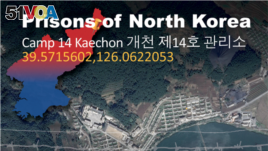Oct 10, 2017
While North Korea continues to threaten its neighbors and the world with missile tests, the regime of Kim Jong Un continues to exploit and repress its own people through a vast prison camp system.
Indeed, the State Department recently exposed details about one type of prison camp known as kwan-li-so, or political prison camps, inside the repressive nation. Kwanliso prisoners are forced to work in terrible conditions in mines or other facilities for the benefit the regime. In general, prisoners are not expected to survive the brutal conditions in these camps.

Prison Camps of North Korea - Camp 14 Kaechon. (File)
Kaechon political prison camp is said to hold 15,000 prisoners, all serving life sentences. Like all kwanliso in North Korea, Kaechon is designed to segregate from the general prison population those considered “enemies of the State” and to punish them for political crimes through unending hard labor.
Some Kaechon prisoners are victims of the regime's “three generations of punishment,” in which three generations of a prisoner's family are also sent to the camp without having committed a crime themselves. Induced starvation is common among prisoners, who are driven to catch and eat rodents, frogs, and snakes.
Hwasong is reported to be a total control zone divided into three sections for prisoners whose crimes differ in severity.The National Human Rights Commission of South Korea has estimated there are approximately 20,000 prisoners in Hwasong. Unconfirmed reports suggest prisoners may be used in the construction of the Punggye-ri nuclear test site.
The Chongjin political prison camp has an estimated population of 5,000 prisoners. Some NGO reports indicate enhanced levels of economic interaction between the camp and adjacent areas, possibly indicating the increased economic importance of prison camp labor.
According to the State Department's Annual Country Report on Human Rights Practices, defectors reported deaths were commonplace in the kwanliso as the result of summary executions, torture, lack of adequate medical care, and starvation. The 2014 UN Commission of Inquiry report cited “extremely high rate of deaths in custody,” due to starvation and neglect, arduous forced labor, disease, and executions.
It is more important than ever to speak out on behalf of the suffering North Korean people.
"Promoting human rights and democratic governance is a core element of U.S. foreign policy,” said U.S. Secretary of State Rex Tillerson. The United States will continue to speak out for the fundamental human rights of the North Korean people.